 Operation and Maintenance
Operation and Maintenance
 Linux Operation and Maintenance
Linux Operation and Maintenance
 What are environment variables in linux
What are environment variables in linux
What are environment variables in linux
In Linux, environment variables refer to system predefined parameters; it is equivalent to a global variable, exists in all Shells, has inheritance, and can store information about the shell session and working environment.

#The operating environment of this tutorial: linux5.9.8 system, Dell G3 computer.
1. The concept of environment variables
1.1 The meaning of environment variables
Environment variables are general It refers to some parameters that specify the operating environment in the operating system, that is, the parameters predefined by the system. It is equivalent to a pointer. If you want to view the value of a variable, you need to add "$".
Environment variables are a feature of the bash shell and are used to store information about the shell session and working environment. Allows data to be stored in memory so that it can be accessed by programs and scripts running on the shell. This data can be used to identify users, systems, shell characteristics, and any other data that needs to be stored.
1.2 Classification of environment variables
1.2.1 According to the scope of action
In Variables in Linux can be divided into environment variables and local variables:
1) Environment variables: equivalent to global variables, exist in all Shells, and have inheritance;
2) Local variables Variables: Equivalent to local variables, which only exist in the current Shell. Local variables include environment variables, and non-environment variables do not have inheritance.
1.2.2 According to life cycle
1) Permanent: The configuration file needs to be modified, and the variables take effect permanently;
2) Temporary: Use export Definition, invalid after closing the shell.
2. How environment variables are organized

Each program has an environment table, which is an array of character pointers , each pointer points to an environment string terminated with '\0'. The third parameter of the Main function is the environment table address.
3. Common environment variables
3.1 PATH
This variable specifies the search for commands path.
【Example】

Explanation: It can be seen from this that the value of PATH in the current directory. It represents the search path for each instruction executed in the current directory, with each directory separated by a colon. When an instruction is executed, the system will search for it in the system file, and execute it if found; otherwise, it will not execute it.
3.2 HOME
This variable specifies the user's home working directory, which is the default directory when the user logs in to the Linux system.
3.2.1 The main working directory under ordinary users
[Example]

3.2 .2 The main working directory under the super user
[Example]
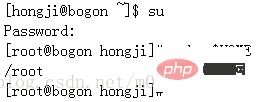
Explanation: The environment variable is a variable whose value changes with the user vary from one to another.
3.3 HISTSIZE
This variable specifies the number of historical commands to save.
【Example】

Explanation: A maximum of 1,000 command records can be saved in the Linux system.
3.4 LOGNAME
This variable specifies the login name of the user to be displayed.
【Example】

3.5 HOSTNAME
This variable specifies the host name
【Example】

##3.6 SHELL
This variable specifies the user’s currently used parser. 【Example】
4. Commands to modify and display environment variables
4.1 echo
#This command is used to display the value of an environment variable.4.2 env
This command specifies to display all environment variables and values.
【Example】
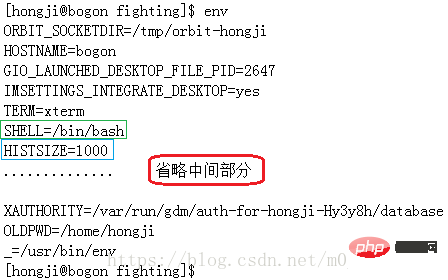
4.3 set
This command specifies local variables.
【Example】

4.4 export
This command specifies to set a new environment variables.
【Example】

#Note: Environment variables are generally represented by uppercase English letters and underlines.
4.5 unset
This command specifies the clearing of environment variables.
【Example】
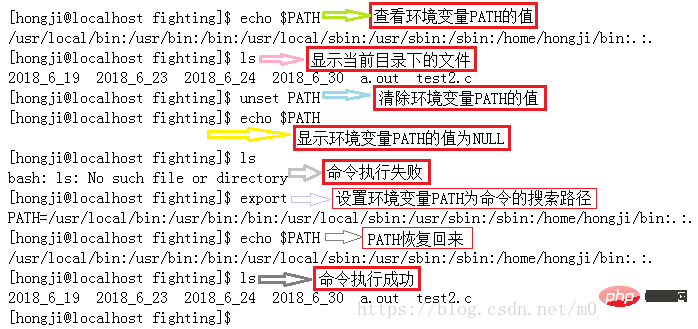
4.6 readonly
This command is used to set only Read environment variables.
【Example】

Explanation: After setting the environment variable MY_ENV to read-only mode, it cannot be modified until the user logs out. .
5. File that stores environment variables
5.1 /etc/profile
The function of this file is to log in when the user logs in Get the system environment variables every time, only once.
5.2 /etc/bashrc
After the /etc/profile file is executed, the user will read the file if he wants to open the bash shell. If you want to perform certain operations every time you open the bash shell, you can set it in this file.
5.3 ~/.bash_profile
Each user can use this file to enter shell information dedicated to his or her own use. This file is only executed once when the user logs in. By default, it sets some environment variables and executes the user's .bashrc file.
The modification of this file by a single user will only affect every subsequent login to the system. Therefore, you can set special environment variables or special operations for a single user here, and then it will obtain these new environment variables or perform certain special operations every time it logs in, but only when logging in
5.4 ~/.bashrc
This file contains bash information dedicated to a single person's bash shell, when logged in and every time a new shell is opened. is read.
A single user's modification of this file will affect every time he logs in to the system and every time he opens a new bash. Therefore, you can set special environment variables or special operations for a single user here. Then every time it logs in to the system or opens a new bash, it will obtain the corresponding special environment variables and special operations.
5.5 ~/.bash_logout
Execute this file every time you exit the system (exit the bash shell).
6. Obtain environment variables through code
[Example 1]
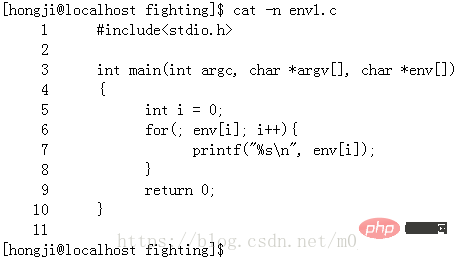
Note: Command line No. 3 The first parameter is the environment table address, which is a character array pointer.
Run result:
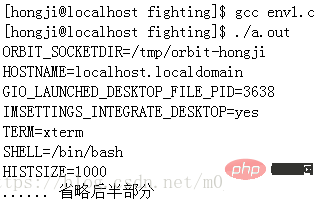
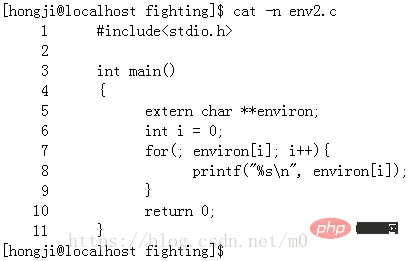
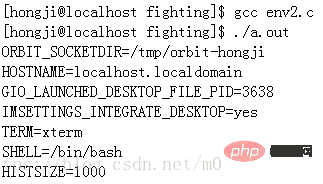
7. Obtain or set environment variables through system calls
Usually use the getenv and putenv functions to access specific environment variables instead of using environ variables. However, if you want to view the entire environment, you must use the environ pointer. 【Example 1】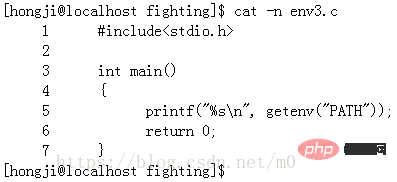

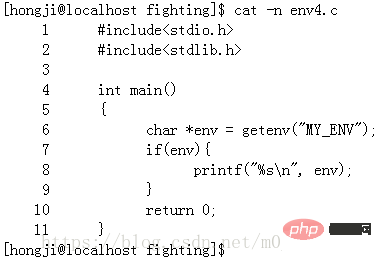
Run results:
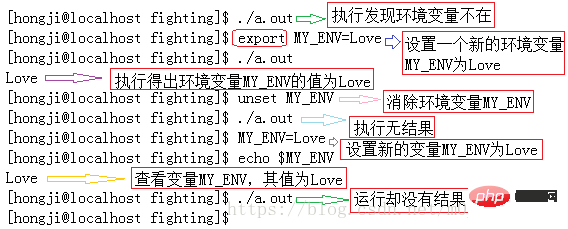
Explanation: "export MY_ENV=Love" exports environment variables, which can be inherited by subprograms; and " MY_ENV=Love" exports ordinary variables and does not have inheritance (the same as the getenv function).
Related recommendations: "Linux Video Tutorial"
The above is the detailed content of What are environment variables in linux. For more information, please follow other related articles on the PHP Chinese website!

Hot AI Tools

Undresser.AI Undress
AI-powered app for creating realistic nude photos

AI Clothes Remover
Online AI tool for removing clothes from photos.

Undress AI Tool
Undress images for free

Clothoff.io
AI clothes remover

AI Hentai Generator
Generate AI Hentai for free.

Hot Article

Hot Tools

Notepad++7.3.1
Easy-to-use and free code editor

SublimeText3 Chinese version
Chinese version, very easy to use

Zend Studio 13.0.1
Powerful PHP integrated development environment

Dreamweaver CS6
Visual web development tools

SublimeText3 Mac version
God-level code editing software (SublimeText3)

Hot Topics
 deepseek web version entrance deepseek official website entrance
Feb 19, 2025 pm 04:54 PM
deepseek web version entrance deepseek official website entrance
Feb 19, 2025 pm 04:54 PM
DeepSeek is a powerful intelligent search and analysis tool that provides two access methods: web version and official website. The web version is convenient and efficient, and can be used without installation; the official website provides comprehensive product information, download resources and support services. Whether individuals or corporate users, they can easily obtain and analyze massive data through DeepSeek to improve work efficiency, assist decision-making and promote innovation.
 How to install deepseek
Feb 19, 2025 pm 05:48 PM
How to install deepseek
Feb 19, 2025 pm 05:48 PM
There are many ways to install DeepSeek, including: compile from source (for experienced developers) using precompiled packages (for Windows users) using Docker containers (for most convenient, no need to worry about compatibility) No matter which method you choose, Please read the official documents carefully and prepare them fully to avoid unnecessary trouble.
 Ouyi okx installation package is directly included
Feb 21, 2025 pm 08:00 PM
Ouyi okx installation package is directly included
Feb 21, 2025 pm 08:00 PM
Ouyi OKX, the world's leading digital asset exchange, has now launched an official installation package to provide a safe and convenient trading experience. The OKX installation package of Ouyi does not need to be accessed through a browser. It can directly install independent applications on the device, creating a stable and efficient trading platform for users. The installation process is simple and easy to understand. Users only need to download the latest version of the installation package and follow the prompts to complete the installation step by step.
 BITGet official website installation (2025 beginner's guide)
Feb 21, 2025 pm 08:42 PM
BITGet official website installation (2025 beginner's guide)
Feb 21, 2025 pm 08:42 PM
BITGet is a cryptocurrency exchange that provides a variety of trading services including spot trading, contract trading and derivatives. Founded in 2018, the exchange is headquartered in Singapore and is committed to providing users with a safe and reliable trading platform. BITGet offers a variety of trading pairs, including BTC/USDT, ETH/USDT and XRP/USDT. Additionally, the exchange has a reputation for security and liquidity and offers a variety of features such as premium order types, leveraged trading and 24/7 customer support.
 Get the gate.io installation package for free
Feb 21, 2025 pm 08:21 PM
Get the gate.io installation package for free
Feb 21, 2025 pm 08:21 PM
Gate.io is a popular cryptocurrency exchange that users can use by downloading its installation package and installing it on their devices. The steps to obtain the installation package are as follows: Visit the official website of Gate.io, click "Download", select the corresponding operating system (Windows, Mac or Linux), and download the installation package to your computer. It is recommended to temporarily disable antivirus software or firewall during installation to ensure smooth installation. After completion, the user needs to create a Gate.io account to start using it.
 Ouyi Exchange Download Official Portal
Feb 21, 2025 pm 07:51 PM
Ouyi Exchange Download Official Portal
Feb 21, 2025 pm 07:51 PM
Ouyi, also known as OKX, is a world-leading cryptocurrency trading platform. The article provides a download portal for Ouyi's official installation package, which facilitates users to install Ouyi client on different devices. This installation package supports Windows, Mac, Android and iOS systems. Users can choose the corresponding version to download according to their device type. After the installation is completed, users can register or log in to the Ouyi account, start trading cryptocurrencies and enjoy other services provided by the platform.
 How to automatically set permissions of unixsocket after system restart?
Mar 31, 2025 pm 11:54 PM
How to automatically set permissions of unixsocket after system restart?
Mar 31, 2025 pm 11:54 PM
How to automatically set the permissions of unixsocket after the system restarts. Every time the system restarts, we need to execute the following command to modify the permissions of unixsocket: sudo...
 Why does an error occur when installing an extension using PECL in a Docker environment? How to solve it?
Apr 01, 2025 pm 03:06 PM
Why does an error occur when installing an extension using PECL in a Docker environment? How to solve it?
Apr 01, 2025 pm 03:06 PM
Causes and solutions for errors when using PECL to install extensions in Docker environment When using Docker environment, we often encounter some headaches...





